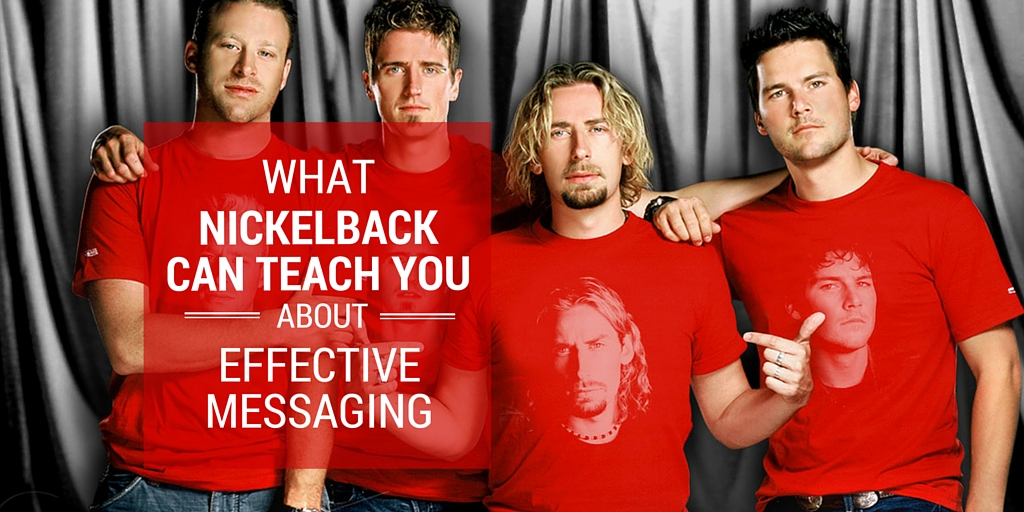Right off the bat here, let me be clear about something. I can’t stand Nickelback. Their music is repetitive, unoriginal, and if you’ve heard one song, you’ve heard them all. And that is exactly why they are one of the best-selling bands of all time. We can learn a lot from them.
I actually had no idea until I looked them up on Wikipedia recently that Nickelback was as popular as they are. I’ve never met someone who actually admitted they like the band (except my 15-year old nephew and the poor kid just doesn’t know any better).
But someone is buying their music. As in hundreds of millions of people. And no road trip is complete without me hearing at least one of their songs on the radio as I furiously reach for the “SCAN” button.
They are everywhere. And for good reasons:
Repetition.
Predictability.
To prove just how repetitive and predictable their music is, listen to this mashup of two of their songs
The songs are virtually identical. Which is exactly why they are successful.
All kidding aside, the ultimate reason they are successful comes down to one word, the summation of repetition and predictability:
Familiarity.
We like things that are familiar. It’s the same reason that McDonald’s is so successful. You walk into McDonald’s and very little surprises you. If you had a Big Mac three years ago in Nashville, it probably tastes the same today in Sheboygan.
The Power of Repetition
As much as it pains me personally to admit, Nickelback are marketing geniuses. They found a formula and they follow it repeatedly.
To their fans, it’s endearing. To their fans, a Nickelback song is like cuddling up with a childhood blanket or scarfing down a Big Mac. No surprises. Comforting. Familiar.
I am reminded of my time working in politics years ago. One of the campaigns we studied intently was George W. Bush’s first gubernatorial campaign in Texas. He ran on four themes only. And only four:
- education reform
- tort reform
- welfare reform
- tougher juvenile justice laws.
That was it.
He used those same words over and over. Education (not schools) reform. Tort (not legal) reform. Welfare (not government assistance) reform. Tougher juvenile justice laws (not legal reform for children).
Every time he spoke, you knew what to expect. It was beyond annoying for the reporters and politicos covering the campaign, but to his fans, they loved it. Like a Nickelback song or a McNugget (I hear they aren’t made of pink goop anymore…mmmm).
Bush stayed disciplined with his message to the point that when a reporter asked him if he had a fifth priority, he said, “Yes. To pass the first four.”
And he won.
Why Repetition Works
Repetition works in every area of life, from marketing to sales, from leading a team at work to leading your children at home.
Repetition is effective for four reasons:
1. There is a lot of noise in the world.
Noise makes it difficult to hear you. And even if you are heard, you are easily forgettable five seconds later.
Repetition helps you cut through the noise.
2. Each repetition builds on the last.
Think back to a song you loved growing up.
Over time, you knew every word. But it took numerous (sometimes dozens) of repetitions for you to know the words.
Each time, though, you remembered a little bit more. Once you got the chorus down, you started adding lines to it. Until one day, you knew every word.
3. People love repetition.
Think back again to that song.
Once you knew all the words, did you suddenly hate it? Probably not. You might have loved it all the more.
Remember, repetition breeds predictability, which leads to familiarity. It’s comforting. And we like comfort.
People love repetition because it makes their lives easier. Ask any Texas who voted in 1994 and I’d bad a decent percentage of them could tell you what George Bush ran on twenty years ago.
4. It makes it easier on you.
One of my biggest struggles when I first started telling my story on podcasts, summits, and other interviews was my concern with repetition.
I had this wild assumption that people had actually heard of me before. Even crazier, I assumed they remembered the story I’d told. HA!
So, each time, I felt like I had to change something. I felt like I had to offer some revolutionary new concept. And I sucked at it.
Then I realized that all successful communicators are repetitive.
If you heard one Zig Ziglar speech you heard them all. And yet he delivered thousands of highly paid speeches and sold millions of tapes and CDs over the years.
If you listen to one episode of the Dave Ramsey Show, you probably don’t need to listen to anything else, let alone buy his books or courses. And yet, he’s been on the radio with the same story and message for two decades.
The same is true of every great communicator, even Nickelback.
Want to get through to the world with your message?
Repeat, repeat, repeat.
It really works!
Do you struggle with being repetitive? If so, why?
Questions?
Text me anytime at (260) 217-4619.
Or…check out some of my free reports to help you get on the right track:
 |
 |
 |
 |
 |
 |
 |
 |
 |
